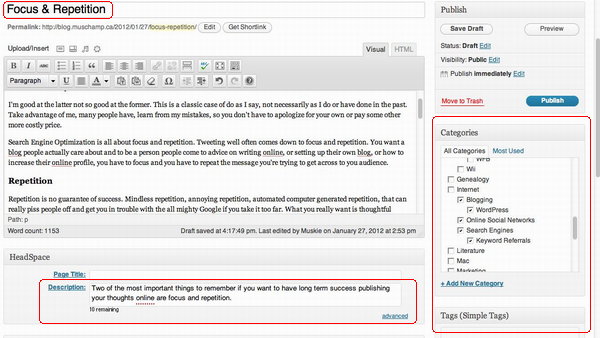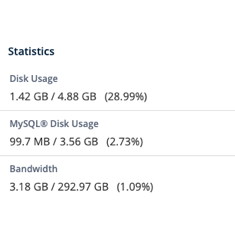Focus & Repetition
January 27th, 2012
A day doesn’t go by when someone doesn’t tweet another posting on how to blog better, or how important it is to blog, or the power of social networks in building a brand, or… You get the picture. Most of this advice isn’t new and it doesn’t even get right down to what is really important. If you want to increase your GoogleJuice or your Klout about a particular topic, it is all about focus and repetition.
I’m good at the latter not so good at the former. This is a classic case of do as I say, not necessarily as I do or have done in the past. Take advantage of me, many people have, learn from my mistakes, so you don’t have to apologize for your own or pay some other more costly price.
Search Engine Optimization is all about focus and repetition. Tweeting well often comes down to focus and repetition. You want a blog people actually care about and you want to be a person people come to for advice, you have to focus and you have to repeat the message you’re trying to get across.
Repetition
Repetition is no guarantee of success. Mindless repetition, annoying repetition, automated computer generated repetition, that can really piss people off and get you in trouble with the all mighty algorithms. What you really want is thoughtful repetition with variance. If you cram in the same keyword phrase over and over and over again on a single web page, GoogleBot will probably notice and you may well get punished for it. Instead of worrying about optimal keyword density, you should think how can I make my point effectively? You want to do so with as few words as possible, while still including the keywords, phrases, and most importantly the ideas you want to convey.
Repeating keywords and phrases over and over is so 1990s. Repetition in 2012 ideally involves having other people repeat your message, words, and phrases. You can write the most brilliant Tweet or blog post ever, but if only your 200 fans/followers/readers discover it, you’re not going to become influential or famous reaching 200 people at a time. However if people Like your post or Retweet your witticism you will reach a wider audience. The best kind of repetition is: voluntary, spontaneous, and someone else’s effort on your behalf.
In order to make it easy for people to Retweet and Like what you write online you want to consider social sharing buttons and being active on social networks yourself. You also need a content management system. Hand coding and maintaining HTML is also not an effective use of most people’s time.
Word Choice

You need to choose your first words carefully. The title should be short and convey the primary idea you’re trying to express. A good title is Retweetable. You also need to take the time to enter a brief description of your post into your CMS and craft a good opening sentence or two. Along with the title that is what people who use RSS feed readers and other news aggregators will see. People have become very adapt at scanning the screen for the most interesting tidbit of information and then focusing in and drilling down.
Focus
I’m capable of focusing. I’ve completed degrees and other challenging tasks that have taken sustained effort over an extended period of time. But this blog and this domain contain a lot of information on too many topics. I’ve been self-publishing content online since 1995, my interests change. This domain has been in Google since 2001 and this blog online since 2005. I’ve written things I probably shouldn’t have. I’ve had to apologize, make corrections, even take stuff down. Muschamp.ca is my personal domain, this is my personal blog. It is all me, warts and all. However if you want to become famous or influential or make money off the content you publish online you need to focus.
You need to ask yourself why you want to publish online. Is it for fame or money? Is it to show off your expertise or talent? Is it to help other people? Knowing why you ‘re doing something is often more important than knowing how to do something. You can learn “how”, some people never learn “why”.
A lot of my blog posts were composed in my head while lying awake in bed. Then I eventually got up and wrote them down, edited them and made them less stream of conscious. Sometimes I failed. Sometimes I rush home and write something in a hurry immediately after the event I’m writing about has taken place. Other times I’ll spend so much time researching and writing and gathering links ending up with a monstrous post few people will read and no one will retweet. You never know what will become popular quickly, but you can make an educated guess.
When I help someone setup up a website or a blog, I try to find out why they want to publish online and what they plan to write about. People who don’t have a good answer to “why” rarely stick with blogging. It is important to determine what you plan to publish in advance. Writing about everything isn’t focused. I advise people to predetermine the categories they want to write about, enter them into their CMS, and to stick with them as much as possible. WordPress has both Categories and Tags, most modern content management systems have something similar. You sometimes see the rather imposing word “taxonomy” thrown about. Taxonomy is Categories and Tags and other methods of organizing and classifying data. The reason you need Categories and Tags is to help you focus.
Search Engines Rarely Forget
As long as I’ve been self publishing online and as long as online search engines have existed I’ve taken to running little experiments. Often this has involved dubious keywords or slightly risqué topics or headlines. You should resist doing this. It takes away from your focus, it leads to dubious keyword referrals though amusing to some, ultimately they aren’t anything to put on your resume. They could even land you in some hot water, remember you’re always writing for your future boss. As someone who hasn’t always had a boss, I’ve obviously not been doing a very good job or haven’t done a very good job in the past. Learn from my mistakes and the mistakes of others such as Michael Crooks and Angie Varona.
Here are someone else’s 26 Tips for Writing Great Blog Posts, the advice is decent, practical, there are some good examples, but some people need to focus more on the why and less on the how or they could end up in a situation similar to Micheal’s, Angie’s, or mine. One last piece of advice never blog about human anatomy.
E-A-T for Focus and Repetition
Focus must be en vogue, as a quotation on the importance of focus appeared in my news reader. Now in 2019 people talk about E-A-T which stands for expertise, authority, and trustworthiness. So you need to think about you can demonstrate your expertise, authority, and trustworthiness. However, the reason you’re not a popular A-list blogger maybe your content just sucks or like Hector J. Cuevas you can’t keep your website online. Other people continue to write about the importance of focus, including at the Harvard Business Review or at least their blog network. Focus, repetition, timeliness, timelessness and apparently expertise, authority, and trustworthiness are the most important characteristics in Quality writing.
This entry was originaly posted on , it was last edited on and is filed under: Personal Improvement and tagged: Blogging, SEO, Social Media.






13 CommentsLeave A Comment Now